125th Street (Manhattan)
Coordinates: 40°48′39″N 73°57′09″W / 40.8108°N 73.9526°W
125th Street is a two-way street that runs east-west in the New York City borough of Manhattan, from First Avenue on the east to Marginal Street, a service road for the Henry Hudson Parkway along the Hudson River in the west. It is often considered to be the "Main Street" of Harlem, and is co-named Martin Luther King, Jr. Boulevard.
Notable buildings along 125th Street include the Apollo Theater, the Adam Clayton Powell Jr. State Office Building, the Hotel Theresa, the Studio Museum in Harlem, the Mount Morris Bank Building, the Harlem Children's Zone, the Church of St. Joseph of the Holy Family, and the former West End Theatre, now home to the La Gree Baptist Church.
History
The street was designated by the Commissioners' Plan of 1811 that established the Manhattan street grid as one of 15 east-west streets that would be 100 feet (30 m) in width (while other streets were designated as 60 feet (18 m) in width).[1]
Neighborhoods
The western part of the street runs diagonally between the neighborhoods of Manhattanville and Morningside Heights from the northwest from an interchange with the Henry Hudson Parkway at 130th Street. East of Morningside Avenue it runs east-west through central Harlem to Second Avenue, where a ramp connects it to the Robert F. Kennedy (Triborough) Bridge. However, 125th Street continues to First Avenue, where it connects to the southbound FDR Drive and the Willis Avenue Bridge.
West of Convent Avenue, 125th Street was rerouted onto what was, prior to 1920, called Manhattan Street. What remains of the original alignment of 125th Street was renamed La Salle Street at that time. The remaining blocks run between Amsterdam Avenue and Claremont Avenue. The New York Times lamented the name changes, noting that the new names had "somewhat doubtful nomenclature," and that the City's "Aldermen like French names" but gave no rationale for the moves otherwise.[2] A block of the original 125th Street in this area was de-mapped to make the super-blocks where the Grant Houses projects now exist.
A proposal to convert the street into a Trans-Harlem Expressway died when funds were diverted from the proposed 125th Street Hudson River bridge at the street's western end.
Beginning in the late 1990s, many sections of 125th Street have been gentrified and developed with such stores as MAC Cosmetics, Old Navy, H&M, CVS/pharmacy, and Magic Johnson Theaters. In collaboration with the community, the city has developed a plan for the 125th Street corridor focusing on reinforcing and building upon its strengths as an arts and cultural corridor.[3]
Fault line
A rift in the crust runs along underneath this street from the East River to New Jersey and is known as the 125th Street Fault or the Manhattanville Fault.[4][5][6] It is suspected to have caused a magnitude-5.2 earthquake in 1737, two smaller ones in 1981,[7] as well as a 2.4 magnitude quake in 2001.[6] The fault line, which skims across the top of Central Park and runs to Roosevelt Island to the southeast, creates a fault valley deep enough to require the IRT Broadway – Seventh Avenue Line to use a trestle bridge between 122nd and 135th Streets. Riverside Drive also elevates to cross over the fault valley.
Public transportation
The following New York City Subway stations are located at 125th Street (west to east):
- 125th Street at Broadway serving the 1 train
- 125th Street at St. Nicholas Avenue serving the A B C D trains
- 125th Street at Lenox Avenue serving the 2 3 trains trains
- 125th Street at Lexington Avenue serving the 4 5 6 <6> trains
Metro-North Railroad's Harlem – 125th Street station is also on 125th Street, at Park Avenue.
The planned Second Avenue Subway will turn on 125th Street, serving a station at Lexington Avenue that would be the terminal for the line and connect to the preexisting station.
Gallery
-
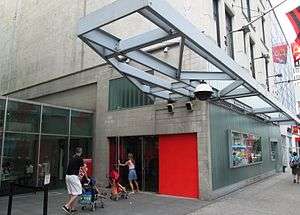
The Studio Museum in Harlem
(144 West 125th St.) -

Harlem Savings Bank, listed on the
National Register of Historic Places (NRHP)
(123 East 125th St.) -
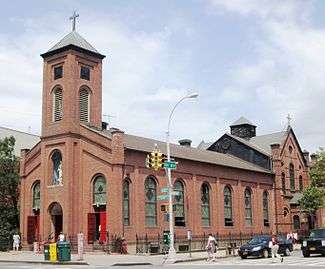
St. Joseph of the Holy Family Church
the oldest existing church in Harlem and above 44th Street[1]
(401 West 125th St.) -
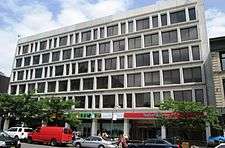
Sydenham Hospital Clinic
formerly the Commonwealth Building[2]
(215 West 125th St.)
- ^ Dunlap, David W. (2004). From Abyssinian to Zion: A Guide to Manhattan's Houses of Worship. New York: Columbia University Press. ISBN 0-231-12543-7., p.292
- ^ White, Norval; Willensky, Elliot; Leadon, Fran (2010), AIA Guide to New York City (5th ed.), New York: Oxford University Press, ISBN 9780195383867, p.529
-
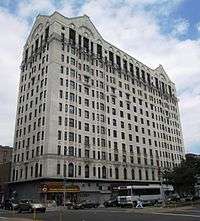
Hotel Theresa, now Theresa Towers,
a NYC landmark and on the NRHP
(West 125th St. and Adam Clayton Powell, Jr. Blvd.) -
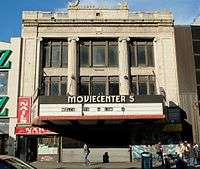
Victoria Theater, now being renovated into a mixed-use building[1]
(237 West 125th St) -
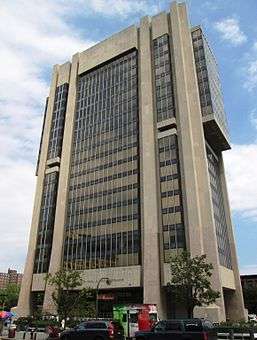
Adam Clayton Powell Jr. State Office Building
(163 West 125th Street) -
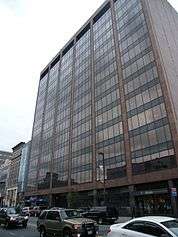
55 West 125th Street
where Bill Clinton has his office
Notable occupants
- As of 2011, former president Bill Clinton maintains an office on 125th Street.[8][9]
In popular culture
- The intersection of 125th and Lexington Avenue is the location where Lou Reed buys heroin on the Velvet Underground's "I'm Waiting for the Man" from their seminal 1967 debut album, The Velvet Underground & Nico.[10]
References
Notes
- ↑ Morris, Gouverneur, De Witt, Simeon, and Rutherford, John [sic] (March 1811) "Remarks Of The Commissioners For Laying Out Streets And Roads In The City Of New York, Under The Act Of April 3, 1807", Cornell University Library. Accessed June 27, 2016. "These streets are all sixty feet wide except fifteen, which are one hundred feet wide, viz.: Numbers fourteen, twenty-three, thirty-four, forty-two, fifty-seven, seventy-two, seventy-nine, eighty-six, ninety-six, one hundred and six, one hundred and sixteen, one hundred and twenty-five, one hundred and thirty-five, one hundred and forty-five, and one hundred and fifty-five--the block or space between them being in general about two hundred feet."
- ↑ "Harlem Street Renamed" New York Times (June 27, 1920)
- ↑ New York City Economic Development Corporation (NYCEDC) 125th Street Project
- ↑ Kaminer, Ariel (March 19, 2011). "Preparing for the Day the Earth Moves in the City". The New York Times. Retrieved 2015-09-29.
- ↑ Lee, Denny (May 12, 2002). "California, Here We Come: Scientists Warn of Earthquakes Here". The New York Times. Retrieved September 29, 2015.
- 1 2 "Small Earthquakes Strike New York City" Duke Geological Laboratory website
- ↑ Shahid, Aliyah (March 17, 2011). "NYC due to be hit by killer quake?". New York Daily News. Retrieved 2015-09-29.
- ↑ Frractenberg, Ben. "Bill Clinton Renews Lease on Harlem Office Space" DNAinfo (November 8, 2010)
- ↑ Leonard, Tom. "Harlem's identity under threat from developers", The Telegraph, March 16, 2008. Accessed April 8, 2008. "Harlem has seen rapid gentrification since the late 1990s and 125th Street - included last year in a list of America's 10 greatest streets - is now home to Bill Clinton's office."
- ↑ The Velvet Underground, "I'm Waiting for the Man", The Velvet Underground & Nico, Verve, 1967.
External links
 Media related to 125th Street (Manhattan) at Wikimedia Commons
Media related to 125th Street (Manhattan) at Wikimedia Commons